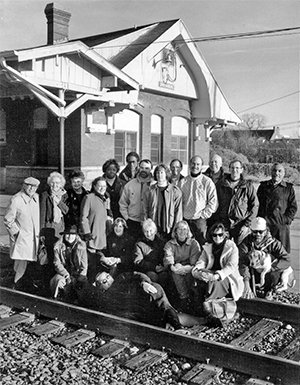About Us
Hub City Writers Project is a literary nonprofit organization located in Spartanburg, South Carolina. Comprised of an acclaimed literary book publisher, an independent bookshop, and a literary programmer focused on education and outreach, our mission is cultivating readers and nurturing writers in both the Spartanburg community and throughout the South to foster an inclusive literary arts culture.
Celebrating 30 years in 2025, Hub City Press is the South’s premier independent literary press. Focused on finding and spotlighting extraordinary new and unsung writers from the American South, our curated list champions diverse authors and books that don’t fit into the commercial publishing landscape. By offering these voices a national platform, we work to transform and expand the national perception of the American South in literature and beyond. Our list publishes 8-10 literary titles each year and we maintain a backlist of over 150 titles.
Our importance in the region, as one of the very few literary presses that not only exists but thrives, is unparalleled. We are the only press publishing contemporary English language fiction by Southern authors to national and international acclaim. In recent years we've had numerous Best Book of the Year nods from NPR and Kirkus, books longlisted for the Center for Fiction’s First Novel Prize and The Story Prize, and the PEN/Voelcker Award. Our books have received coverage in the New York Times, the Washington Post, the San Francisco Chronicle, the Los Angeles Times, Wall Street Journal, the Boston Globe, magazines like The New Yorker, Entertainment Weekly, People, O, The Oprah Magazine, and on NPR and Good Morning America.
Celebrating its 15th anniversary in 2025, the Hub City Bookshop has become an important cultural placemaking and tourism asset for the City of Spartanburg as it develops and grows. Early adopters of an idea that is increasingly taking hold, we believe bookstores are an important common good, deepening literacy in our communities and increasing civic engagement in our citizens. As Spartanburg’s headquarters for book culture, we empower our community by preserving local heritage and promoting literacy initiatives that inspire a love of reading.
Our Story
Founded in 1995 by three Spartanburg writers with a mission to make their city a center for the literary arts, Hub City now employs a staff of eight and occupies a historic building we renovated on the town square. We publish 8-10 titles each year, with a special emphasis on debut writers. Our hallmark is a book that reinterprets, reimagines, or interrogates the modern or historical South.
The first book we published was Hub City Anthology, a place-based collection of personal essays and art about the experience of living local. From there, Hub City began publishing writers across South Carolina and, eventually, the American South. Over the years, Hub City Press has evolved into the most active and ambitious independent literary publisher in the South, selling books nationally and releasing works by authors from Kentucky to Florida to Texas. We remain the only independent press dedicated to publishing only Southern writers.
Along the way, Hub City became a nonprofit organization and a vigorous literary arts programmer, sponsoring an annual writers' conference, summer camps, workshops, scholarships, residencies, and scores of readings each year. We offer a national fellowship program for mid-career writers, a summer writers conference, publishing internships, youth writing camps, and we sponsor an annual book drive that places 5,000 children's books in low-income local homes. When Spartanburg lost its independent bookstore, Hub City stepped in and led a renovation of the ground floor of the historic Masonic Temple as a new hub of books, coffee, and baked goods. Hub City Bookshop became the nation’s first full-service bookshop operated by a non-profit organization.
Our vision is to achieve an inclusive literary arts culture for Spartanburg and the broader region that elevates Southern voices. With a dynamic team of staff and a hard-working board of directors, Hub City has become one of the most substantial literary arts organizations in the nation and has shown that literary communities are vital in all places large and small.
Why 'Hub City'?
 In May 1995, a trio of writers in Spartanburg, SC, began to talk in a downtown coffee shop about how they could help preserve a sense of place in their rapidly changing Southern city. What their community needed, they said, was a literary identity. Modeling their organization after the Depression-era Federal Writers Project, they chose the name Hub City because it invoked Spartanburg's past as a 19th-century railroad center and challenged them to make their hometown a center for literary arts.
In May 1995, a trio of writers in Spartanburg, SC, began to talk in a downtown coffee shop about how they could help preserve a sense of place in their rapidly changing Southern city. What their community needed, they said, was a literary identity. Modeling their organization after the Depression-era Federal Writers Project, they chose the name Hub City because it invoked Spartanburg's past as a 19th-century railroad center and challenged them to make their hometown a center for literary arts.

